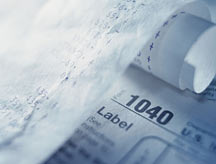Yet another thing to worry about: Taxes
Adding to your frustrations and losses is the possibility of getting hit with a tax bill. Time to plan.

(Money Magazine) -- Can things get any worse for fund investors? Apparently so. You already know what a terrible year 2008 was for your stock funds. Through Nov. 21, domestic equity funds fell 48% on average, while their foreign counterparts did even worse - dropping 54%. But it's not just that the average fund lost around half its value. Every single stock fund was down for the year, according to Morningstar.
But wait, there's even more: By the end of the year, some not-so-lucky investors will have received taxable gains from their money-losing funds. Yes, that sounds crazy. Why should you have to owe taxes on a fund that's lost half of your investment? Shouldn't your funds be sending you a gift, asking for your forgiveness?
Blame IRS rules. Unless you're investing in a tax-deferred retirement account, such as a 401(k) or an IRA, you're on the hook for the realized capital gains that may have resulted from your manager's trading earlier in the year. "Fund managers had to sell appreciated shares to raise cash for redemptions, which triggered capital-gains distributions," says Tom Roseen, senior research analyst at Lipper. "So you have insult on top of injury."
Your fund may also have held cash or bonds earlier in the year that generated dividends or interest income. For qualified dividends and long-term gains, you will typically owe taxes at a 15% rate on the distribution; interest income and short-term gains will be taxed as ordinary income, which can be as high as 35%.
Add it all up and you might have to come up with serious cash. For example, T. Rowe Price Mid Cap Growth, which is down 42.5% so far in 2008, paid out $1.99 in short- and long-term distributions in December. That worked out to 6.2% of net asset value.
Elsewhere, Vanguard Precious Metals & Mining, which lost 59%, handed out $2.27 a share in distributions, or nearly 18% of its value, while Matthews China, down 50%, paid out $5.94 a share, or 30%.
Fortunately, funds delivering such hefty tax bills are in the minority, since most fund managers were already sitting on plenty of losses, which they could use to offset realized gains.
Still, if you happen to own a foreign stock fund or a commodity fund - which were two of the highest-flying categories in the prior bull market - you are more likely to face a tax hit. Why? Performance-chasing investors piled into these funds during the good times, and they were just as quick to bail out when the market began its slide, forcing the managers to sell to meet redemptions.
If you're reading this story in December, you may not have time to avoid a tax bill for 2008 (more on that in a minute). But with a little planning you can make your overall investing strategy more tax-efficient. As research by Roseen found, the average fund loses nearly two percentage points of return each year to taxes - that's the single biggest drag on your returns.
So here are a few tips for fending off Uncle Sam going forward:
Most funds declare taxable distributions in mid- or late December, so if the new year hasn't arrived and your fund hasn't paid out its distribution yet, consider selling it and capturing the loss. You can deduct up to $3,000 in capital losses from ordinary income. And remember, losses beyond that amount can be carried forward indefinitely to offset future gains.
IRS rules don't permit you to jump back into the same fund for 31 days - if you want to preserve the tax benefit. But to avoid throwing off your asset allocation, you can opt for a different fund or ETF that follows a similar investing style. Even if it's too late to make this move for the 2008 tax year, keep it in mind as you manage your portfolio in the coming years.
One of the best ways to cut down on taxes is to pay attention to asset location - that is, choosing the right type of account (taxable or tax deferred) for each of your investments. Bonds, which throw off income, and stock funds that trade frequently and rack up short-term gains are best kept in tax-sheltered accounts such as your 401(k) or IRA because of their potential for higher taxes. By contrast, stock funds that practice buy-and-hold investing, such as index funds or ETFs, are better held in taxable accounts, since they're already tax-efficient.
Granted, it's difficult to create a perfectly tax-efficient portfolio. You may not have enough room in your IRA to hold all your bondholdings. Or you may have only enough money to fund a 401(k). But as you build your taxable accounts - and as you rebalance regularly - stick with low-turnover stock funds and then gradually switch to bonds in your 401(k).
Depressed by all the negative signs in your portfolio? Cheer up. In the next few years, most every stock fund will be tax-efficient. "Nearly every stock fund will have a built-in reserve of capital losses, which will cushion future gains for several years," says Bill Reichenstein, finance professor at Baylor University. "And at these prices you can buy stocks for next to nothing - it's the only free lunch I have seen in finance."
Of course, it's a lunch that most investors are in no mood to enjoy. But that's another story. ![]()



